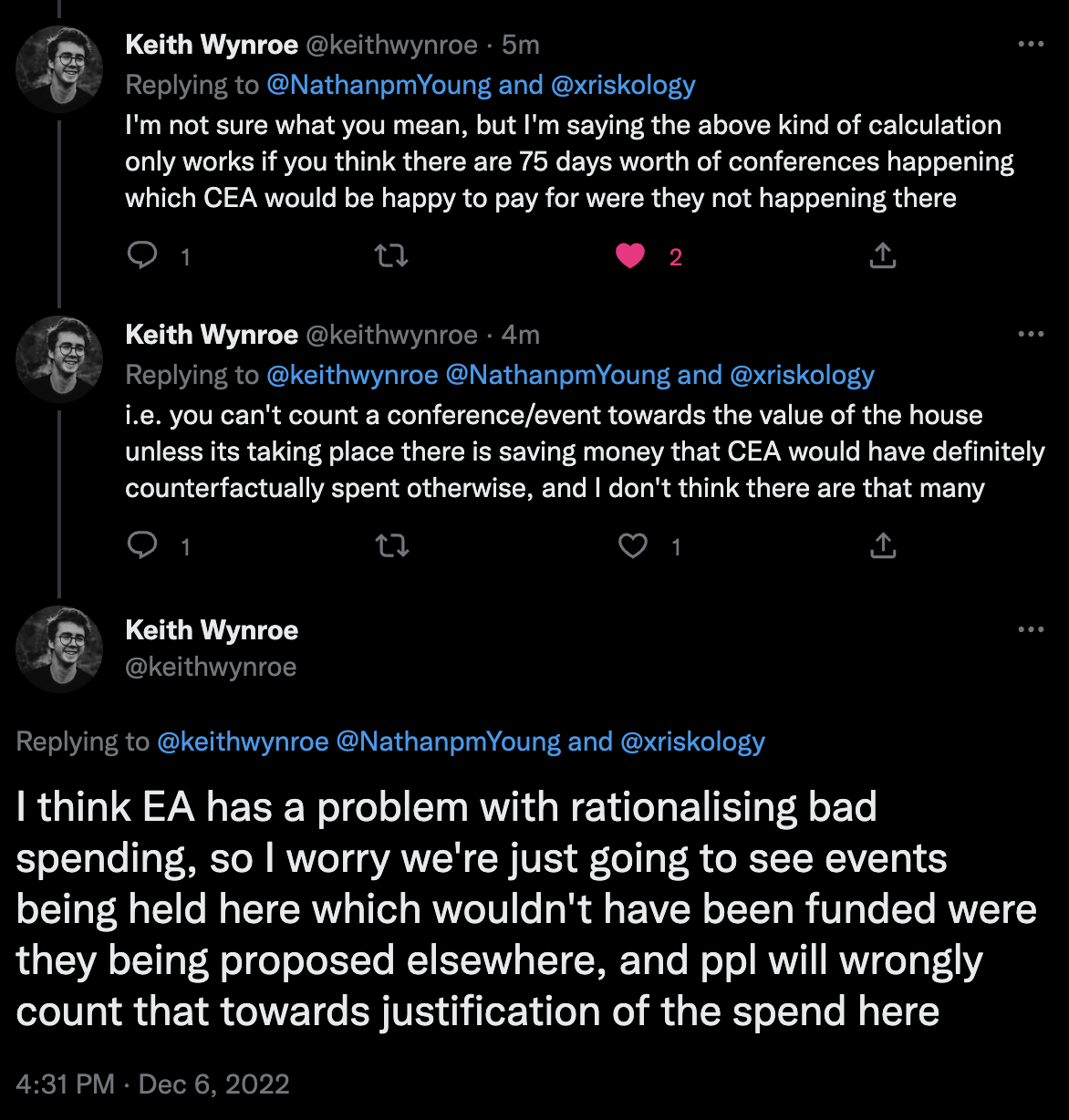Edit to add (9/1/2023): This post was written quickly and I judged things prematurely. I also regret not reaching out to Effective Ventures before posting it. Regarding my current opinion on the Abbey: I don't have anything really useful to say that isn't mentioned by others. The goal of this post was to ask a question and gather information, mostly because I was very surprised. I don't have a strong opinion on the purchase anymore and the ones I have are with high uncertainty. More thoughts in my case for transparent spending.
Yesterday morning I woke up and saw this tweet by Émile Torres: https://twitter.com/xriskology/status/1599511179738505216
I was shocked, angry and upset at first. Especially since it appears that the estate was for sale last year for 15 million pounds: https://twitter.com/RhiannonDauster/status/1599539148565934086
I'm not a big fan of Émile's writing and how they often misrepresent the EA movement. But that's not what this question is about, because they do raise a good point here: Why did CEA buy this property? My trust in CEA has been a bit shaky lately, and this doesn't help.
Apparently it was already mentioned in the New Yorker piece: https://www.newyorker.com/magazine/2022/08/15/the-reluctant-prophet-of-effective-altruism#:~:text=Last year%2C the Centre for Effective Altruism bought Wytham Abbey%2C a palatial estate near Oxford%2C built in 1480. Money%2C which no longer seemed an object%2C was increasingly being reinvested in the community itself.
"Last year, the Centre for Effective Altruism bought Wytham Abbey, a palatial estate near Oxford, built in 1480. Money, which no longer seemed an object, was increasingly being reinvested in the community itself."
For some reason I glanced over it at the time, or I just didn't realize the seriousness of it.
Upon more research, I came across this comment by Shakeel Hashim: "In April, Effective Ventures purchased Wytham Abbey and some land around it (but <1% of the 2,500 acre estate you're suggesting). Wytham is in the process of being established as a convening centre to run workshops and meetings that bring together people to think seriously about how to address important problems in the world. The vision is modelled on traditional specialist conference centres, e.g. Oberwolfach, The Rockefeller Foundation Bellagio Center or the Brocher Foundation.
The purchase was made from a large grant made specifically for this. There was no money from FTX or affiliated individuals or organizations." https://forum.effectivealtruism.org/posts/Et7oPMu6czhEd8ExW/why-you-re-not-hearing-as-much-from-ea-orgs-as-you-d-like?commentId=uRDZKw24mYe2NP4eq
I'm very relieved to hear money from individual donors wasn't used. And the <1% suggests 15 million pounds perhaps wasn't spent. Still, I'd love to hear and understand more about this project and why CEA thinks it's cost-effective. What is the EV calculation behind it?
Like the New Yorker piece points out, with more funding there has been a lot of spending within the movement itself. And that's fine, great even. This way more outreach can be done and the movement can grow. But we don't want to be too self-serving, and I'm scared too much of this thinking will lead to rationalizing lavish expenses (and I'm afraid this is already happening). There needs to be more transparency behind big expenses.
Edit to add: If this expense has been made a while back, why not announce it then?


Your comment made false claims, and these false claims substantially exaggerated the issue (which isn't to say there isn't a serious issue left worth addressing after the claims are corrected and the exaggerated removed). I assumed (and still assume) this was just a well-intentioned mistake on your end.
I pointed out that these claims were false. This wasn't intended as an attack on you (people can go back and look at the comment and judge for themselves whether it was appropriate). Because I assumed (and still assume) you are interested in the truth, my assumption was that you would reply with something like, "Oh, that's my bad. I've edited accordingly", before turning back to discuss the substantive issue.
Had you done that, I think that people would have moved on to discussing the substance of your concern (I doubt that anyone much cares about this discussion of clarifications, in and of itself).
Instead, your response felt to me fairly dismissive. It did not feel to me like you truly acknowledged that you'd made a mistake here. I think this choice on your end was well intentioned, and I can see where you were coming from: I think you were just trying to drag people's attention back to what you see as the core issue.
Unfortunately, I think that not simply acknowledging the mistake can be misinterpreted as you not really being interested in the truth and as instead just trying to score points. It is somewhat natural that this might make people uninterested in engaging with you, because you might not look to them like a good faith actor.
I think the EA Forum is far from perfect, in many ways (perhaps including some that you point to), but I do think you're underestimating how much this is a reaction to what looks like a failure to acknowledge misrepresentation.
By the way, I'm not sure whether it will come across this way, but the fact that I'm writing this message reflects the fact that I do genuinely believe you're a good faith actor, and also reflects the fact that I think you deserve an attempt at an explanation. I hope that my genuine desire for productive conversation comes across, though I wouldn't be surprised if I have communicated poorly at some point in this message. If so, I apologise.